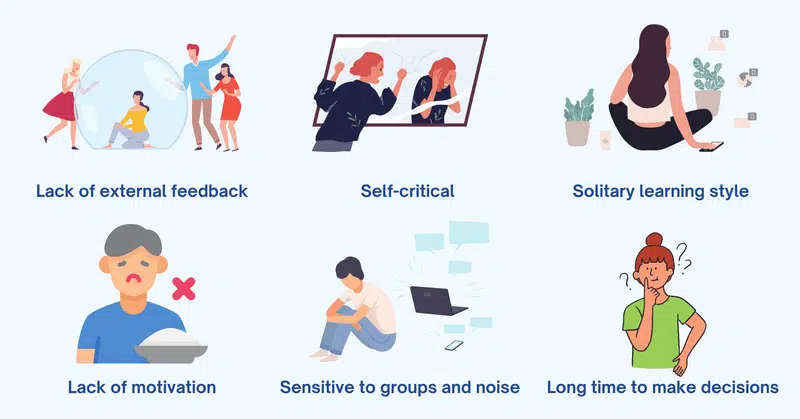Intrapersonal communication is a highly effective internal dialogue that guides your beliefs, behaviors, and actions. It’s a powerful tool for developing your authentic self, communicating with others, and boosting your happiness.
This article will discuss everything you need to know about intrapersonal communication. This includes various aspects such as its history, definition, and types of intrapersonal communication.
We will also look at examples of intrapersonal communication and its advantages and disadvantages. Also, we will focus on the importance of intrapersonal communication in today’s world.
Let’s take a look first at our table of contents:
- What Does Intrapersonal Mean?
- What Is Intrapersonal Communication?
- What Is Internal Monologue?
- The History of Intrapersonal Communication
- Different Types of Intrapersonal Communication
- What Is The Difference Between Intrapersonal and Interpersonal Communication?
- How Does Intrapersonal Communication Impacts Interpersonal Communication?
- What Is an Example of Intrapersonal Communication?
- What Are the Advantages of Intrapersonal Communication?
- What Are the Disadvantages of Intrapersonal Communication?
- Why Is Intrapersonal Communication Important?
- Why Is Intrapersonal Communication Often the Most Important Communication You Engage In?
- How To Improve Intrapersonal Communication?
- FAQs
What Does Intrapersonal Mean?
Intrapersonal is a term that refers to an individual’s relationship with themselves. It encompasses people’s thoughts, feelings, beliefs, and attitudes about themselves and their place in the world. Intrapersonal intelligence is one of eight types of intelligence identified by Howard Gardner’s Theory of Multiple Intelligences.
Intrapersonal intelligence involves understanding oneself and being abused to use this knowledge effectively for personal growth and development. Those who possess intrapersonal skills often have a heightened sense of self-awareness and can better manage their emotions, thoughts, and behavior effectively. This type of intelligence allows individuals to control their lives by making conscious decisions based on self-understanding rather than outside influences or opinions.
What Is Intrapersonal Communication?

Intrapersonal communication is the communication you have with yourself. Many people also know this as self-dialogue.
In addition to the external and internal stimuli that trigger other forms of communication, intrapersonal communication arises from within ourselves. For example, we might communicate with ourselves about what we want to eat due to the internal stimulus of hunger.
We may also react intrapersonally to an event we witness. Intrapersonal communication does not require an observer. The other forms of communication must be perceived by someone else to count as communication; however, intrapersonal communication takes place only inside our heads.
This means that intrapersonal communication is the internal dialog or monologue that guides your beliefs, behaviors, and actions. It can sometimes refer to how you talk to yourself when no one is around. Also, several times, you could think of dead or fictional people.
People also use intrapersonal communication to describe what others think of them. An example is a sentence like, “you’re stupid.” An example would be a sentence like “she thinks she’s better than everyone else.”
What Is Internal Monologue?
Internal monologue, also known as inner monologue, is an internal thought process that occurs in the mind of individuals. It is a form of self-talk that occurs without external input or influence and reflects a person’s innermost thoughts and feelings. Generally, the internal monologue can be considered analogous to talking out loud to oneself.
This type of mental dialogue aims to understand one’s own experiences and ideas better and provide insight into one’s actions or beliefs. Internal monologue can take on many forms; some think predominantly in words, while others have a more visual approach. It can also be used for problem-solving or decision-making by reflecting upon one’s opinions and beliefs about any situation.
The History of Intrapersonal Communication
The concept is relatively new. The term “intrapersonal communication” was coined in the 1960s by American psychologist Carl Rogers. He used it to refer to modes of self-expression through which people mediate their inner worlds.
Rogers defined intrapersonal communication as “the flow of meaning within an individual toward or away from the self”. He also described it as a means by which we communicate with ourselves to explore our thoughts, feelings, and attitudes.
While interpersonal, media and public communication receive much attention, this has not been the case with intrapersonal communication. It has not received a great deal of formal study. Also, it is rare to find courses devoted to the topic. So, it is generally separated from the remaining types of communication.
The main distinction is that intrapersonal communication is not created with the intention that another person will perceive it. In all the other forms, the fact that the other person receives and understands their message is significant.
Different Types of Intrapersonal Communication

It’s a conversation between you and yourself that happens in your mind. It’s your way of communicating with yourself through thoughts and feelings. Here, we will focus on the types of intrapersonal communication.
Self-Awareness
It is vital to examine your intrapersonal communication to understand how you see yourself about others. This self-reflection determines your beliefs, ideas, values, and attitudes. Your attitude is connected to the values you own, and values are based on your core beliefs.
Perception
Your perception of others defines you. Your self-concept and how you see others are two sides of the same coin; one affects the other. We tend to judge ourselves and others, but this is only natural because we all have expectations.
However, It is essential to be aware of your own biases. Also, we should not judge others based on them.
Expectation
The third type of intrapersonal communication is expectations. It is essential to know what you expect from yourself and others.
For instance, some people might prefer fast-paced and dynamic environments. However, other people would be on the lookout for stable jobs.
You can use intrapersonal communication to discuss anything that matters to you personally. It could be an emotional or mental concern or something related to your health. You might even use it when trying to make decisions about your future.
The purpose behind this type of communication is that we must try to understand ourselves first, making it easier for us to understand others (and vice versa).
What Is The Difference Between Intrapersonal and Interpersonal Communication?

Intrapersonal communication involves thinking, feeling, and observing your thoughts and feelings because you believe them. This can be quite a difficult task to master. This is because most people are accustomed to talking out loud with themselves all day long without even realizing what they are doing.
It may initially seem strange for some people to stop talking and start listening internally. However, getting used to this way of being in the world can be very liberating. It allows you to be more self-aware than ever before because you have time for introspection without having another person speaking their thoughts into yours!
Let’s see a few differences between interpersonal and intrapersonal communication.
Parties Involved
Interpersonal communication involves communication between two or more people. It can occur in person, by phone, or even via email. In contrast, intrapersonal communication happens within one’s mind, with one’s thoughts, feelings, and ideas.
Reasons
Interpersonal communication is used to tell stories, share ideas, or relay information to others or a group. However, Intrapersonal communication is used to reflect on something that happened. You can use it to make goals and plans, visualize the future, and get closer to your feelings.
Media and Feedback
Interpersonal communication feedback can be verbal or non-verbal. Non-verbal forms of feedback include a nod or shrug. On the other hand, verbal forms are usually short statements like, “I see what you mean” or “I hear you.”
You can do interpersonal communication can in many ways. These include — in-person, over the phone, by computer, or in writing. However, Intrapersonal communication is always done in person and has no actual form of feedback because it is a conversation between you and yourself.
How Does Intrapersonal Communication Impacts Interpersonal Communication?

Intrapersonal communication, or self-talk, is a form of communication between the self and the self. It’s how we talk to ourselves.
Interpersonal communication involves two people communicating with each other. It refers to talking about yourself one-on-one with yourself. It consists in speaking directly to your thoughts and feelings to help guide your behavior or decision-making process.
Intrapersonal communication can be considered a way to “talk things out” with yourself to make better decisions about what actions will lead to positive results in your life.
It is not possible to build good interpersonal skills without having good intrapersonal communication. Only after one completely understands his needs can one focus on others. Also, a person can contribute positively to the team through intrapersonal skills such as self-awareness.
People enjoy working with team members who have an understanding of their strengths. People also develop a sense of confidence using intrapersonal communication. It helps one inspire others.
Intrapersonal skills, internal dialogue, self-awareness, and interactions with others form a person’s emotional intelligence.
What Is an Example of Intrapersonal Communication?
Intrapersonal communication is the process of understanding and communicating with your own thoughts, feelings, needs, and emotions. It’s your private self talking to your public self.
This concept may be familiar to you in the form of internal dialogues, such as:
I just want a sandwich.
I can’t believe I forgot about the meeting.
I’m so stressed out.
Self-talk is critical because it enables us to understand our thoughts and emotions without asking other people for their interpretations or feedback on what we’re saying to ourselves.
We all have different personalities and ways of thinking about ourselves. Some people are more reflective than others. However, even those who don’t spend much time thinking about themselves will likely recognize that they spend at least some time looking inward for answers about their feelings or beliefs.
People engage in intrapersonal communication in different ways. Here are some examples to illustrate the various forms of it.

Thinking
The most common example of intrapersonal communication is thinking. People spend a lot of time thinking about their personal lives and conduct, such as what they eat for lunch or wear to a party.
Daydreaming is another form of it; when people daydream, their minds wander away from reality and into fantasy worlds. They can imagine themselves fighting villains alongside fictional characters or being excited about an upcoming event like a baseball game.
Vocal
Many people find it easier to vocalize their thoughts than to think in their minds. Some examples include: speaking a script aloud when memorizing lines for a play or talking to yourself in front of the mirror about something that motivates you.
Written
Most people are unaware of numerous examples of written intrapersonal communication in reality. When one maintains a journal of their daily activities, it is an example of it.
Similarly, when one creates a routine or a list based on which they perform tasks. This can also exemplify intrapersonal communication because only the creator will follow this routine or list.
What Are the Advantages of Intrapersonal Communication?

Intrapersonal communication allows you to take a step back from yourself and evaluate your thoughts and feelings. It is an effective method for building self-confidence, self-esteem, and awareness. Here are some advantages:
Understanding Your Emotion
Intrapersonal communication makes you more aware of yourself and your emotions. Today, when life has become so busy and hectic, it has become difficult for everyone to spare time for emotional bonding. But intrapersonal communication helps you understand yourself and your emotions much better.
Building Self-Confidence
When you can recognize your strengths in any area of life, it allows you to feel more confident about yourself. It enables you to examine your shortcomings and areas where improvement is needed.
Also, it helps decrease fear of failure or rejection because you know that even if something goes wrong, there are ways to learn so it won’t happen again.
Empathy
Self-realization allows you to relate to others’ feelings and thus makes it easier for you to understand the other person’s perspective.
Good analysis
Visualization skills are essential in interpersonal communication. Visualizing a situation or a set of circumstances makes it easier to analyze the position or problem. This allows you to make decisions that will likely benefit you and your business.
Building Self-Esteem
Through intrapersonal communication, we learn how our behavior affects other people’s perceptions of us. This means recognizing negative behaviors like dishonesty or bullying while recognizing positive ones such as kindness towards others or generosity with our time; it ultimately teaches us how to best serve ourselves by serving others instead!
Helps Maintain Self-Concept
Intrapersonal communication serves multiple social functions. Internal vocalization can help us achieve or maintain social adjustment.
For example, a person may use self-talk to calm himself down in a stressful situation or remind herself to smile during a social event. Intrapersonal communication also helps build and maintain our self-concept.
What Are The Disadvantages Of Intrapersonal Communication?

This type of communication is a great way to reflect on yourself and get in touch with your inner world, but it can also have some disadvantages.
Lack Of External Feedback
You don’t get feedback from others. While you’re thinking about how what you did impact yourself, no one else is around to tell you how it affected them.
People won’t be able to give advice or support. When something goes wrong, we want someone who understands us well enough to help us through the hard times.
Intrapersonal communication causes some people to isolate themselves when having problems, which can be very dangerous (and unhealthy). It cannot be a person’s only way to deal with things. They need people to talk to when things go wrong in life.
It Can Be Negative And Self-Critical
Reflecting on our lives and making changes based on our observations might seem a good idea at first glance. However, sometimes those observations aren’t what we expected or hoped they would be! And that’s perfectly fine.
But, we cannot only rely on intrapersonal communication for self-reflection. This could lead us toward depression or other mental health issues rather than help us improve ourselves as individuals.
Solitary Learning Style
People with high intrapersonal intelligence may be solitary learners. They absorb information best when they have time alone in a quiet environment to concentrate on their thoughts. This makes them appear aloof or snobbish. However, this is not necessarily true. They might require additional time to complete their work.
Lack Of Motivation
People who have good intrapersonal skills know precisely what they want. So, they lose interest if they encounter an activity that does not connect with their goals. This is why activities such as maintaining a diary are helpful to them.
Sensitive To Groups And Noise
People who have good intrapersonal skills like to work alone. So, they prefer quiet spaces away from large groups of other people. It helps them focus and get the minute details of their work right.
Long Time To Make Decisions
Individuals with high intrapersonal skills take a long time to arrive at decisions. This is because they need more time to determine their feelings about a new idea. It can be frustrating in situations where a quick response is required.
In summary, there are certainly benefits associated with intrapersonal communication, such as clarity about oneself through introspection. However, these benefits may also come at a cost depending upon an individual’s choices.
Why Is Intrapersonal Communication Important?
This communication is essential because it helps you understand yourself. It allows you to explore the possibilities of life and discover your potential. It enables you to recognize the various strengths, weaknesses, and motivations that makeup who you are as an individual.
It increases self-awareness about our values and beliefs on different issues. We also become more aware of our emotions and feelings. Also, it can help you grow in other areas of life, such as building better relationships with people.
This type of self-awareness contributes significantly toward leading a fulfilling life by helping us accept responsibility for our feelings without blaming others.
Also, it helps us make better decisions based on rational thought rather than emotion alone. Furthermore, it improves our social relations and makes us more tolerant toward those who differ from ourselves, politically or culturally.
Why Is Intrapersonal Communication Often the Most Important Communication You Engage In?

Intrapersonal communication is often the most important communication you have because it shapes how you see yourself and others. It means that it becomes essential to how we live our lives (or not).
Because intrapersonal communication occurs within us rather than between us and someone else, it may seem less effective than other forms of talking—but this is rarely true! Intrapersonal conversations are very effective because they happen inside our own minds; we use them all day long without even realizing it.
It Helps Us Understand Our Actions And Decisions Better
Intrapersonal conversations give us insight into why we act a certain way or make certain decisions so that we can work on improving ourselves for the betterment of ourselves and those around us.
It Helps Us Form Better Relationships
Intrapersonal skills allow us to connect with others because they help us understand how people think about themselves and their relationships with others. One must understand the unspoken words or gaps in any conversation to do this.
It Helps Us Enhance Our Mood
It helps create positive change in a person. It alters his attitude and perception of different situations. A couple of cases are outlined below:
- You may be upset because your boss scolded you at work. However, to console yourself, you think it is because he is biased against you.
- There is an upcoming exam. You feel you have not prepared enough. However, consider your progress so far to boost your confidence.
How To Improve Intrapersonal Communication
Intrapersonal communication is one of the most essential skills to master in any field. It involves understanding your own feelings and emotions, as well as the feelings and emotions of those around you. Improving your intrapersonal communication skills can help you become more effective professionally and personally in life and work.
This section will discuss key strategies for improving intrapersonal communication, such as developing self-awareness, learning active listening skills, practicing self-reflection and empathy, and making thoughtful decisions.
With these strategies, you can become a better communicator and improve your overall well-being. Investing in your intrapersonal communication skills is an excellent way to achieve success in any area of life.
1) Know Your Self
Knowing yourself is essential for a successful and fulfilling life. It can help you make the right decisions, have better relationships, and develop a sense of purpose. Self-awareness involves understanding your emotions, motivations, personality traits, and behavior patterns.
It also includes recognizing how you interact with others, how your thoughts and feelings influence your behavior, and how your behavior affects others.
Ask questions about your values, strengths, weaknesses, and interests to know yourself better. Pay attention to how you respond to different situations and reflect on what you learn. A list of seld understanding includes:
- Identifying your values and ensuring they align with your actions is a great way to show respect for yourself.
- Connecting with people who share your values can help you build meaningful relationships.
- Taking time to recognize your emotions can help you understand why you react the way you do in certain situations and manage challenging emotions more effectively.
- Finally, exploring areas of interest allows you to discover new passions, hobbies, and talents. Knowing yourself is an ongoing process that requires patience and dedication.
Effort and perseverance can lead to greater self-confidence and satisfaction in life.
2) Practice Makes Perfect
The more you practice, the better you’ll become at intrapersonal communication. The more you learn about yourself, the easier it will be to connect with others meaningfully.
There are many ways to practice intrapersonal communication; the most important thing is finding something that works for you. Some ideas include:
- Taking care of yourself physically and emotionally
- Participating in social activities that interest you
- Writing in a journal or diary
- Training your brain by reading challenging books, watching stimulating movies, or listening to exciting music.
The best way to learn is by doing. The more practice you put into Intra-personal communication, the better you’ll become at it. So don’t be afraid to try new things and explore different ways of practicing intrapersonal communication.
3) Be Mindful
Being mindful is an integral part of life. It helps us to be present in the moment, stay focused on our goals, and be aware of our own and others’ feelings.
Mindfulness can be developed by paying attention to our thoughts, feelings, body sensations, and environment. Being mindful also involves being non-judgmental and accepting of ourselves and others.
Practicing mindfulness can help us to become more self-aware and foster a sense of peace and harmony in our lives. Daily mindfulness practice is a great way to start building the habit. You can begin by carving out a few daily minutes to focus on your breath, observe your thoughts and feelings without judgment, and practice being present at the moment.
Regular pauses throughout the day to be aware and connected with your inner self can also help bring greater clarity and peace to your life.
Even small changes like this can make a big difference in fostering mindfulness and helping us to better connect with ourselves and our world.
4) Listen Carefully
Listening carefully is essential for communication and success in all aspects of life. Not only does it help you understand what is being said, but it also demonstrates respect and shows that you are engaged in the conversation.
It can be challenging to remain focused and fully comprehend what is being said, but with practice, it can become an invaluable part of your communication style.
Learning to listen carefully requires patience and focus. Pay close attention to the speaker’s words and body language, and use nonverbal cues such as nodding or making eye contact to show that you’re listening. Don’t interrupt the speaker or allow yourself to become distracted.
It’s also important to actively try to understand the context of the conversation and ask questions to clarify any information that may be unclear.
Taking notes can also be helpful. By listening carefully, you can pick up on subtle nuances in the conversation, which will help you better understand the other person’s point of view.
Active listening can help build trust, foster relationships, and improve overall communication.
5) Reflect On Your Actions And Words
Taking time for self-reflection is an integral part of personal growth. It allows us to think about how our actions and words affect our relationships with others.
It is also a way to gain insight into how we can make changes to better ourselves.
When reflecting, it is essential to ask yourself questions such as:
- What was my intention in this situation
- How did I contribute to the outcome?
- How could I have handled things differently?
You can gain insight into your behavior and how it affects the people around you by taking a few moments to consider these questions.
Additionally, reflecting on your actions and words can help you develop greater empathy and understanding.
By learning from your mistakes, you can make positive changes that will benefit both you and those around you.
Taking time for self-reflection is important to developing a healthier and more meaningful life.
6) Be Patient With Yourself
It’s important to remind yourself to be patient with yourself.
We all have our own set of goals and aspirations, but life is a journey that takes time and effort to reach the end. It can be challenging to stay focused, especially when things don’t go as planned, or you feel overwhelmed with tasks.
But it’s important to remember that progress takes time and that taking breaks and taking things one step at a time is okay.
It’s ok not to be perfect and to make mistakes as long as you learn from them and use them to grow. Instead of beating yourself up for not reaching your goals immediately, focus on the little victories and milestones along the way.
Celebrate each one and be proud of yourself, even if it’s a small accomplishment. It’s important to give yourself credit for what you have achieved and the effort you put in.
Be patient with yourself and trust the process, as it will eventually lead you to where you want to be.
7) Practice Empathy
Practicing empathy is an essential skill in our daily lives. It can help us better understand and relate to those around us, from our family and friends to strangers we interact with regularly.
Empathy helps us to recognize the feelings, thoughts, and experiences of others and allows us to respond with compassion and understanding. To practice empathy, listen closely to what the other person is saying.
Try to put yourself in their shoes and imagine how you would feel in their situation. Ask questions to gain more insight into their feelings, and practice active listening by repeating what they have said.
Additionally, ensure that you are aware of your body language and tone of voice, as they can make a big difference in how the other person perceives your response. If you are overwhelmed by the other person’s emotions, take a step back and take a few deep breaths.
Finally, remember that it’s okay not to have all the right answers or solutions; simply being there for the other person can be enough. Practicing empathy is a powerful way to build stronger relationships with those around you.
FAQs
What is Intrapersonal Communication?
Intrapersonal communication is a form of communication that focuses on understanding and relating to the thoughts, feelings, and needs of the other person. It’s a type of non-verbal communication that helps us connect with one another on a deeper level.
What Is The Difference Between Interpersonal And Intrapersonal Communication?
Interpersonal and intrapersonal communication are two very distinct communication forms with different purposes. Interpersonal communication helps individuals build relationships with others, while intrapersonal communication helps individuals understand themselves better. Interpersonal communication is communication that takes place between two or more people. It involves verbal and nonverbal forms of communication, such as facial expressions, gestures, and body language. Intrapersonal communication, on the other hand, is a type of communication that occurs within an individual’s mind. This type of communication relies on self-talk, reflecting on thoughts and feelings, and analyzing one’s behavior.
Why Is Intrapersonal Communication Important?
This communication is necessary because it permits you to understand yourself better. It enables you to realize the capacity for success and the assorted views, strengths, and weaknesses that make your personality. It promotes a greater familiarity with our ideals and values related to various topics. Also, it can help you grow in other areas, such as building better relationships with people. It can help build trust and respect, increase understanding and empathy, and reduce conflict. It can also help to improve relationships and lead to greater success in life.
How to Improve Intrapersonal Communication
There are several ways that you can improve your intrapersonal communication skills. Start by asking questions, listening attentively, being open and honest, expressing your thoughts and feelings healthily, being patient with yourself, and practicing empathy.
In Conclusion
Intrapersonal communication is a powerful tool that you can use to guide your actions, beliefs, and behaviors. If you want to succeed in any area of life, you must pay attention to the messages you are sending yourself.
This critical way of communication can help protect your mental health and provide motivation when times are tough. Also, it boosts your confidence levels when they’re low and even helps with creativity. It happens because ideas flow freely through your brain without interference from others’ thoughts or opinions.
It helps people navigate relationships with their family and friends. It also helps us to understand what is bothering us. Most importantly, it does not allow us to make impulsive decisions.

Ranu Kumari is a Professional Writer and a Marketing enthusiast who currently runs her own Marketing Consultancy, LatitudeBOX. She has written promotional articles for multiple brands and has published her work in Scopus indexed journals. She is passionate about expressing her thoughts and ideas to connect with her readers in a voice that they understand.
